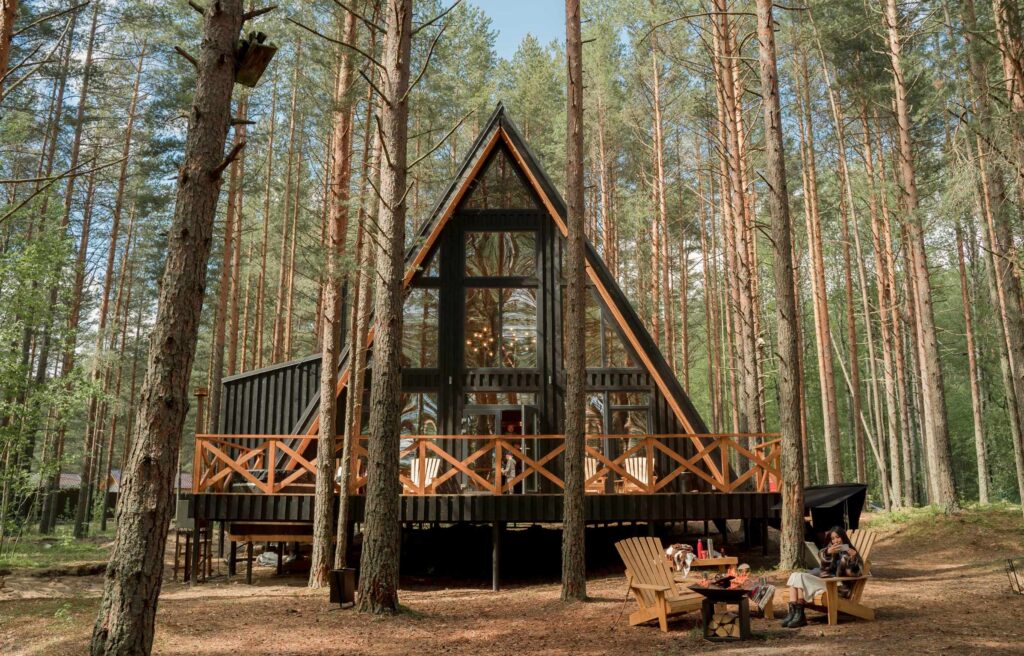A digital nomad enjoys a life of freedom, flexibility, and exploration. Finding suitable accommodation is one of the biggest challenges for those working remotely and traveling the world. A string of temporary residences replaces the traditional home concept, each offering its unique experience. Secure digital nomad housing significantly affects the quality of a nomad’s life and work. A recent survey shows digital nomads spend around $1,955 monthly on accommodation.
It varies depending on location, with cities like San Francisco and New York being considerably more expensive, while Southeast Asia or South America destinations are typically more budget-friendly. Several resources can simplify the search. Websites like Anyplace, Nomad Stays, Outsite, Spotahome and Hostelworld offer various options, from apartments and houses to hostels and guesthouses. The best choice depends on the individual’s needs, budget, and travel style.
Here are some options to explore –
1. Short-Term Apartment Rentals – Balancing Comfort and Flexibility
Short-term apartment rentals have gained popularity among remote workers. These rentals provide a home-like environment, often equipped with kitchens, living areas, and private bedrooms. Platforms like Selina and Remote Year are fantastic starting points for finding furnished accommodations tailored to digital nomads globally. This accommodation type is ideal for those who value privacy and need a stable working environment.
A 2023 survey by FlexJobs found that 65% of remote workers prefer furnished apartments for stays of one month or longer. Furnished apartments generally have Wi-Fi, utilities, and essential amenities, minimizing setup time. You can unpack and immediately start working. This option is desirable for those planning to stay in one location for several weeks or months.
Even though costs for digital nomad housing can add up, especially in popular destinations, with monthly rates ranging from $1,200 to $3,500, depending on the location and amenities.
Researching local rental markets and negotiating with hosts can sometimes result in 10-20% savings.

2. Coliving Spaces – Fostering Community and Collaboration
Coliving spaces bring digital nomads together by offering a mix of private and communal living spaces. These spaces often include shared kitchens, coworking areas, and social spaces. Companies like Outsite and Selina operate globally, providing coliving options tailored to the needs of remote workers. One significant advantage is the sense of community they foster, making it easier to meet like-minded individuals and network.
A 2022 GCUC study found that 83% of coworkers felt less lonely after joining a coworking space. Besides, 89% stated they were happier since joining a coworking community. Coliving spaces often organize events, workshops, and social gatherings, enhancing the overall experience.
These spaces usually come with all-inclusive pricing, covering utilities, internet, and sometimes even meals. They offer a dynamic alternative for digital nomads who enjoy a social environment and wish to avoid isolation.
It’s important to carefully select a coliving space that aligns with your personal and professional values.
3. Hostels – Budget-Friendly and Socially Engaging
Hostels have long been a favorite among backpackers and budget travelers, and they also serve as a viable option for digital nomads. Modern hostels often provide private rooms, shared dormitories, and communal areas conducive to working. Websites like Coliving.com feature many global accommodations with high-speed Wi-Fi, coworking areas, and networking and social events opportunities.
Hostels are significantly cheaper than most other accommodation options, making them ideal for those on a tight budget. According to a new release in 2023 by GlobeNewswire, the global hostel market was valued at $6.2 billion in 2022 and is expected to grow significantly. The social atmosphere of hostels can be a big draw, providing opportunities to meet fellow travelers and exchange experiences.
Still, the shared nature of hostels may not be suitable for everyone, particularly those who require a quiet and private workplace space. When choosing a hostel, look for reviews that mention the availability of quiet areas and reliable internet.
? Related – The 10 Best Hilton Hotels in the World for Luxurious Stays
4. Extended-Stay Hotels – Combining Convenience and Amenities
Extended-stay hotels cater to guests who need accommodation for longer periods, offering amenities similar to those in apartments but with the added services of a hotel. These hotels typically provide kitchenettes, laundry facilities, and housekeeping services. Brands like Extended Stay America, Marriott’s Residence Inn, and Hyatt House specialize in this accommodation type, making them a convenient option for digital nomads.
The cost of an extended stay in a hotel, a popular option for digital nomad housing, can vary widely, ranging from $800 to $2,500 per month, depending on the location, amenities, and duration of the stay. These hotels often include business centers and meeting rooms, catering to guests’ professional needs. The added security and front desk service offers peace of mind for solo travelers.
Moreover, many extended-stay hotels offer loyalty programs. It allows guests to accumulate points and earn rewards. While extended-stay hotels are more expensive than hostels or short-term rentals, their convenience and amenities can be worth the investment.
For those who value comfort and service, this is a reliable option.
5. House Sitting and Pet Sitting – Unique and Cost-Effective Options
House-sitting and pet-sitting offer a unique way for digital nomads to secure free or low-cost accommodation while experiencing local life. Websites like Nomador and MindMyHouse connect homeowners with sitters who care for their homes and pets while away. This arrangement can be mutually beneficial, providing homeowners with peace of mind and sitters with a place to stay.
House-sitting assignments can range from a few days to several months, offering flexibility. In 2023, TrustedHousesitters reported a community of 175,000 pet-loving members, facilitating pet care in 121 countries worldwide. House sitting can provide an authentic local experience, allowing digital nomads to live like locals and explore neighborhoods off the beaten path.
However, it comes with responsibilities, such as caring for pets, maintaining the property, and handling any issues that may arise. Having an explicit agreement with the homeowner regarding expectations and responsibilities is essential.
While digital nomad housing sitting may not be for everyone, those who enjoy pets and are responsible can find it a rewarding way to travel.

?♀ Also read – How to Find a Profitable Rental Property in Any Market
6. The World of Digital Nomads – Accommodation Options
Choosing suitable digital nomad housing as a digital nomad involves various factors, including budget, duration of stay, desired level of social interaction, and work and housing requirements. Digital nomad abodes come in multiple forms, each with advantages and disadvantages.
Before making a decision, consider your priorities. Do you need a quiet space to focus on work or prefer a more social environment? Are you looking for a luxurious experience or comfortable with basic amenities? These questions will guide you in selecting the correct type of accommodation.
Location is another crucial factor. Being close to public transportation, grocery stores, cafes, and coworking spaces can enhance your experience. Researching neighborhoods in advance and reading reviews from other digital nomads can provide valuable insights. Safety is paramount, especially for solo travelers.
Opt for accommodations with reasonable security measures and positive safety reviews. Also, always have a backup plan if your initial choice does not meet your expectations.
7. Staying Connected – Essential Tips for Digital Nomads
Reliable internet access is non-negotiable. Before booking any accommodation, verify the quality of the Wi-Fi connection. Reading reviews and contacting the host or property manager can provide clarity. Consider carrying a portable Wi-Fi hotspot or a local SIM card with data as a backup. Also, you can try out Saily for a global eSIM solution for digital nomads.
A dedicated desk and chair in your digital nomad housing can significantly improve productivity and comfort. Establishing a routine is essential for maintaining a healthy work-life balance while traveling. Set specific work, exploration, and relaxation hours to maximize your experience. Connect with local communities and events to expand your network and enrich your journey.
Utilize online forums, social media groups, and platforms like Meetup to engage with other digital nomads and locals in your area.
8. Sublets and Local Rentals – Tapping into Authentic Living
For those seeking a more immersive experience, exploring sublets and local rentals through local classifieds and community boards can be rewarding. Websites like Craigslist (in some regions), local Facebook groups, and expat forums often feature listings not found on mainstream rental platforms. This method requires more groundwork and due diligence but can lead to unique, affordable digital nomad housing options.
Moreover, subletting a room or apartment from a resident can offer a deeper cultural immersion. Approximately 281 million people lived outside their country of origin. Many of these individuals are part of expat communities that actively share resources, including housing leads. Engaging with these communities can provide valuable insights into local neighborhoods and living conditions.
These areas often offer a more authentic experience. You can find a good deal in a safe neighborhood.
9. Work-Exchange Programs – Combining Travel with Skill Development
Work-exchange programs offer another avenue for securing accommodation while gaining new skills and experiences. Platforms like Workaway, WWOOF (World Wide Opportunities on Organic Farms), and HelpX connect volunteers with hosts worldwide. Volunteers typically work a few hours a day in exchange for lodging and sometimes meals. This arrangement suits those interested in sustainable living, agriculture, hospitality, or language exchange.
Participation in work-exchange programs often leads to enhanced intercultural competence and personal growth. These programs allow digital nomads to integrate more deeply into local communities, learn new skills, and contribute meaningfully to their host’s projects. At the same time, work exchanges may require a different balance of work and travel than other nomadic lifestyles.
They provide a unique and enriching way to explore the world. It offers digital nomad housing that fosters lasting connections and a deeper appreciation for the places visited.

Recommended read – Is Being a Digital Nomad Worth It?
10. Retreats and Workshops – Focused Productivity in Inspiring Locations
Digital nomads seeking a blend of focused work and personal development might consider attending retreats or workshops. These events often occur in inspiring locations and provide structured environments conducive to productivity and learning. Retreats can range from yoga and wellness getaways to professional development workshops and creative writing courses.
Organizations like Remote Year and Hacker Paradise offer programs that combine travel with professional and personal growth opportunities.
In a survey conducted by the Global Wellness Institute, the wellness tourism market was valued at $639 billion in 2022, with retreats playing a significant role.
Attending a retreat can provide a structured environment to focus on specific personal or professional goals. These experiences often include digital nomad housing, meals, and activities, simplifying logistics for participants while offering an inspiring setting for work and growth.
Retreats offer a chance to step away from daily routines and immerse oneself in a supportive community, fostering creativity and personal growth. These settings often lead to breakthroughs and a renewed sense of purpose.
Frequently Asked Questions (FAQ) on Digital Nomad Housing
1. What is the average duration of stay for digital nomads in one location?
Many digital nomads stay in one location for 1-3 months, depending on visa regulations, work commitments, and personal preferences.
2. Do coliving spaces include coworking areas?
Most coliving spaces have integrated coworking areas or are located near the benefits of coworking spaces, making them ideal for remote workers.
3. What are the common pitfalls to avoid when booking accommodation?
Watch out for hidden fees, unclear cancellation policies, and inaccurate descriptions or photos of the property.
4. Can you negotiate prices for accommodations on booking platforms?
Yes, many hosts on platforms like Airbnb, Vrbo, Nomad Stays, and Anyplace are open to negotiating rates for longer stays, especially during off-peak seasons.
5. What’s the difference between coliving spaces and coworking spaces?
Coliving spaces combine living accommodations with communal areas, while coworking spaces are designed solely for work.
6. What insurance do you need for digital nomad housing?
When securing digital nomad housing, consider travel insurance and digital nomad insurance that covers rental properties, or check if the accommodation includes liability coverage in their policies.
7. What payment methods are accepted for digital nomad accommodations?
Most platforms accept credit cards, but some hosts may prefer cash or bank transfers. Always confirm payment methods in advance.
8. Can you find accommodations that allow short-term storage for your belongings?
Yes, many coliving spaces and extended-stay hotels offer luggage storage solutions for digital nomads with extra luggage or digital nomad equipment.
To Sum Up
Finding suitable digital nomad housing is a crucial aspect of living and working while traveling the world. Remote worker lodging options are plentiful. You can find accommodations that enhance your lifestyle by carefully considering your needs, budget, and preferences. Utilizing available resources and staying informed can simplify the process, allowing you to focus on your work and enjoy the journey.
Building connections within local communities can also lead to unique and enriching housing opportunities.
From Temporary Digital Nomad Stays to Permanent Moves
Relo.AI makes finding accommodation effortless by connecting you to tailored options that match your lifestyle and budget, from remote worker-friendly spaces to community-driven housing.
Also, if a city has captured your heart and you’re ready to settle down, we make relocation hassle-free.
Feel free to schedule a meeting today to explore tailored accommodation and relocation solutions for digital nomads.











